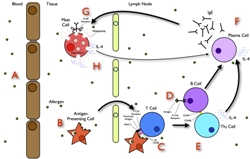
Asthma is a chronic inflammatory disease that makes bronchial tubes predominantly sensitive to irritants. This is characterized by difficulties of breathing.
The warning signs of asthma include:
* Shortness of breath. Asthma patients often say they feel as though they can’t catch their breath, they feel breathless or out of breath. They feel like they can’t get enough air into or out of their lungs.
* A sensation of tightness in the chest. This can feel like someone is squeezing or sitting on your chest.
* Coughing. Coughing in people with asthma is often worse at night or early in the morning, making it difficult to sleep.
* Wheezing. Wheezing is a squeaky or whistling sound when you inhale or exhale.
* Noisy or faster breathing
* Inflammation or swelling of the air passages, characterised by eosinophils in the airway wall
 |
Read how this person cured his asthma the natural way |
* Bouts of wheezy difficulty in breathing
* Quick and considerable changes in airway obstruction (peak flow variation >= 20%)
* Narrowing of the air passages in the lungs and results in increased resistance to airflow
* Symptom-free periods
* Frequent occurrence of allergies
* Bronchial hyper-responsiveness to non-specific stimuli such as histamine or cold air
* Frequent nocturnal bouts and low morning peak flow values
* Significant reversibility with new steroid medicines
* Significant reversibility with medicines that resemble adrenaline, the beta2 agonists
People with asthma can have:
* Wheezing or coughing when they are near an allergen or irritant
* Asthma symptoms brought on by exercises such as biking, running or other brisk activity, especially during cold weather
* Frequent coughing, especially at night (this is occasionally the only symptom of asthma in a child)
* Wheezing sound when they have a cold or another illness
* Wheezing or coughing precipitated by prolonged crying or laughing
Not all people suffer all of these warning signs. In addition, symptoms may vary from one asthma attack to another. Symptoms can also vary in severity. For instance, symptoms may be mildly annoying at times and at other times they can be serious enough to demand your immediate attention. Sometimes, symptoms can be so serious to the point of being life threatening and necessitates medical attention. Symptoms also vary in frequency.
Some asthma patients only have symptoms once every few months, others have symptoms weekly, and while other people have daily symptoms. However, with proper treatment and management, most asthma sufferers can expect to endure minimal or no symptoms, and are able to lead normal, active lives.
Tagged with: asthma prevention • asthma relief
Filed under: Asthma